“Americans who travel abroad for the first time are often shocked to discover that, despite all the progress that has been made in the last 30 years, many foreign people still speak in foreign languages.” - Dave Barry
Dear Reader,
“We’re headed somewhere called Bom Jesus,” Doug told me as we made another hairpin turn up a mountain.
“Uh huh,” I answered as I white-knuckled it navigating the curve in front of me in our rental car. “That makes sense. The hotel we’re staying at is on Bom Jesus Avenue, or something like that.”
My windshield wipers were on full power, and they still weren’t cutting the rain, which splattered on the windshield as if buckets of water were being flung from above.
The ignorance I displayed in travel planning for our trip to Braga was stunning.
Unbeknownst to me, we were actually driving to a hotel in Braga on the top of the sacred mountain of Bom Jesus do Monte, which is a Unesco World Heritage site.
It includes a basilica, a complex of sacred chapels and hotels, renowned art work, Baroque architecture, fountains, gardens, and around 600 years of history.
Not knowing the historic significance of Hotel do Parque in Braga was a little like telling someone you’re visiting Washington D.C. and when they ask you where you are staying you reply, “It’s somewhere called The White House? I think we’re supposed to stay in the Lincoln bedroom?”
We found out that Bom Jesus, which means, “Good Jesus” in English, is one of those handy phrases that could be used as a swear, as in, “Bom Jesus, it’s raining so hard!” or more appropriately, religious praise as in, “Bom Jesus, we made it!”
My black humor jumped right out when I opened the shuttered windows and realized how easy it would be to fall while looking at the view and land two stories below us in the gardens.
“Bom Jesus,” I told Doug, “Do not wander over here in the middle of the night and accidentally open the window while sleepwalking.”
This was shortly before I put my head in what I like to call a “pillow sandwich” for ten minutes on the bed in my favorite recovery position.
The 3.5 hour drive from our new home on the Silver Coast to Braga was mostly uneventful, despite intense rain and briefly getting lost and ending up in the city of Guimaraes instead of Braga.
But still, when Doug asked me how I was doing I mumbled, “Ela es morta,” my new favorite Portuguese colloquialism, from under the pillow.
It means, “she is dead,” and is frequently used to describe people who are still alive, but exhausted.
At that point in the day, we had two hours before Doug’s immigration appointment in Braga, where he was supposed to present reams of paperwork and get them scanned in so that he would officially be allowed to stay for two years.
I didn’t know what would happen if we missed it, but we were NOT going to miss it.
I had carefully prepared all of the paperwork in an accordion file folder, with each section labeled and the money needed for the visa (177,40 Euros) in cash in a plastic sandwich bag brought from the U.S.A.
When we got back to the car and tried to input the address of the immigration office in our phones and the car GPS it wouldn’t pull up.
“We’re on the top of a mountain,” I explained to Doug. “I don’t think we have internet service up here. I’ll just drive us down into Braga, and we’ll pull over and load the directions to get there.”
At the bottom of the mountain, I turned on a side street, fiddled with the phones, and the car GPS and still, nothing was working.
“I’m going to ask for directions,” Doug announced.
“Where?” I asked. “It’s pouring rain.”
But by then he was already out of the car running to a nearby bakery, while I stayed and fiddled with the car GPS.
“I just need to find the street it’s on,” I mumbled, running my finger over the map and finally spotting Rua do Granjinhos.
The car could get me there, but it had no idea where exactly on Rua do Granjinhos we were supposed to be.
“Oh well,” I thought. “Better than nothing.”
When Doug got back in the car, soaking wet, he looked like someone had beaned him on the head.
“I just saw the most beautiful woman in Portugal in that bakery,” he said.
“Did she give you directions?” I asked. “Because if not I have a general idea of where we are going.”
Her directions were the same as the GPS, so we took off for downtown Braga, where we rounded a bend at a fuel station, took a right through a residential area, a left next to commerce center, a right near the hospital, and a right onto a busy city street where a group of senior citizens were huddled waiting for a bus.
We did not see the words, “Rua do Granjinhos” on any signs, but the car said we were there.
“Let me out!” Doug yelled as we passed the bus stop. “I’ll go and ask them for directions.”
He got out, and a bus beeped at me so I went flying around the corner, to repeat the same turns with our car. I hoped that by the time I caught up with Doug he would have some answers.
When I rounded the bend, I saw him running down the street with his hood on and I pulled over and yelled, “Get in!”
“Did they give you directions?”
“They tried!” he said. “No one spoke English, but they really wanted to help me when I showed them the address. One woman kept repeating, ‘hospital’.”
We both looked at the clock. Fifteen minutes to go.
I made the same circuit with our car, looking for a place to park, but no luck.
We got to the same corner again near the hospital and I reached in the backseat, handed Doug the accordion file folder and his passport and said, “I think it’s probably somewhere in this area. I’ll find a place to park. Go! Find your way!”
He jumped out and I mumbled, “Bom Jesus” as a prayer and went around the block again.
Finally, I found a spot in front of a house, and then asked 3 people directions on how to pay for parking in a residential area.
“Fala inglês?” I kept asking.
“Nao,” they would say, shaking their head.
The last thing I wanted was to have to come back to Braga because I got a parking ticket.
Finally, a woman on the street was very kind to show me how to manage the meter, and it shot out a slip of paper I could put it in my car.
I rounded the bend and went into the first official looking building I could find and found a woman and asked her for directions to Doug’s immigration appointment.
She also couldn’t understand me but when she saw the address she ran back up the stairs to find someone who knew and when she came back she pointed across the street to a building.
I crossed the street in front of the building she pointed at and found a man who was just getting out of a car and asked him.
He conferred with the driver, no luck. He gestured to follow him and took me inside of a doctor’s office where he asked the receptionist for help.
She knew … something … from what I gathered.
He led me back outside, rounded the bend by another bakery, and went up a set of stairs where a group of beggars were huddled, and he opened the door to a building and gestured to me as if to say, “Somewhere in here.”
The building looked like an American mall with several levels and offices and shops on each floor. I ran down the hallway looking for a sign for AIMA or SEF until I found a policeman and asked if he spoke English.
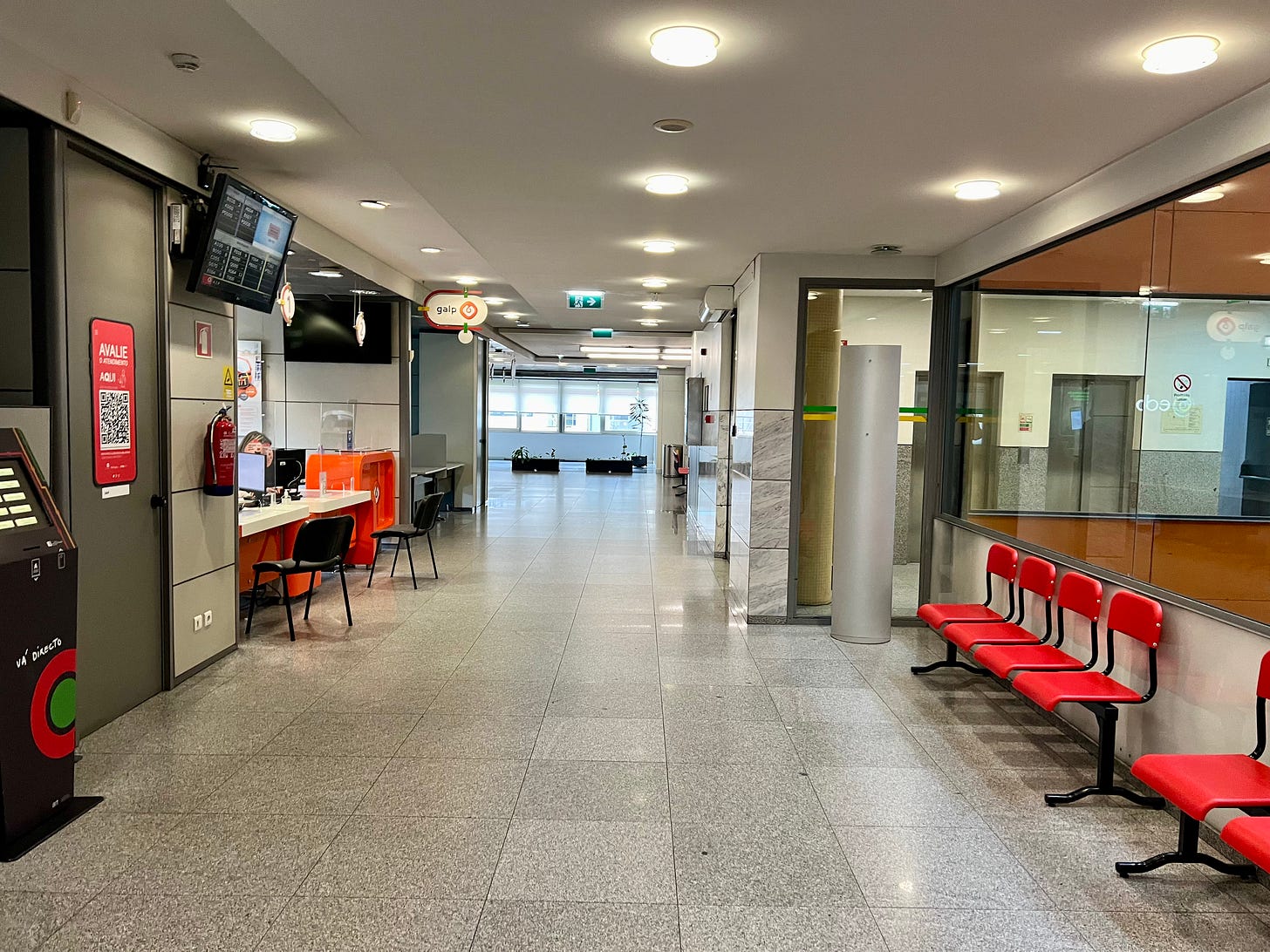
“Yes,” he said, and listened patiently as I described where I was going and why.
“Go up the stairs take a left, then a right, and it will be on your right,” he said.
No wonder my car couldn’t find this address I thought, as I walked up the stairs, this was a tiny office in the middle of the top floor of a mall!
I walked swiftly down the hall until I saw the sign for AIMA and to my amazement, spotted Doug sitting in front of a clerk, with a long line of people behind him, handing her papers from his file folder that she subsequently scanned.
Later, when I quizzed him on how he found his way there, he had a nearly identical story to my own.
He found helpful Portuguese citizens, who only understood enough of what he said to gather that he was lost and looking for an appointment, who went out of their way to help him get there on time.
When he arrived, the desk was empty, and the woman asked him if he had an appointment and whether he was Douglas Blaine.
He said “yes.”
Funny enough, that cash I prepared to be exact, wasn’t needed this time. They wanted our bank card, which we had.
Really, we are so grateful to everyone who helped us find our way.
I would end the story here, except … something even better happened after Doug’s appointment.
We got lost again.
Historic Braga is a labyrinth of cobblestone streets, churches, and historic buildings. At rush hour, after work, it’s not only busy, but has breathtakingly narrow streets we to navigate.
Doug was “starving” and instead of going back to the hotel for dinner, we decided to brave the rain again, park, and get out on what looked like restaurant row.
It was too early for dinner service, which started at 7:00, but we got a tip from a bakery cashier that a restaurant down the street might be open early.
We ran down to the end of the street in the rain, couldn’t find it, but did stumble into a brewery, which ended up not having any “sem gluten” (gluten-free) items on the menu, but again, the waiter sent us to the end of the next street to a restaurant where he said they served “sem gluten” food.
Grateful, we rushed in that direction, but couldn’t find it, and glumly resigned ourselves to finding somewhere else when a waiter on the street smoking a cigarette said to us, “Are you looking for a restaurant that serves gluten-free food? Everything here is gluten-free.”
“Bom Jesus,” I muttered. “Yes!”
He then ushered us into a completely gluten-free restaurant and bakery where we had dinner and bought a large quantity of frozen baked goods to take home with us, including a gluten-free pastel de nata, the famous custard treat of Portugal.
I can’t find their website, but if you are looking for it, here is the name and address:
A Melhor por Samira Guimarães, Rua Dom Paio Mendes 4, Tel: +351 253690401.
I would end it here, but back to Bom Jesus do Monte we went to sleep, when Doug turned on the television and started watching a documentary about a 1950 Douglas C-54D plane that crashed and disappeared on its way from Alaska to … wait for it … Great Falls, Montana. (Great Falls is very close to where we moved from in the U.S.).
It was truly a From Montana to Portugal experience.
Bom Jesus.
Love,
Janelle
P.S. The audio for this goes into more depth, and I made you a quick video about our trip to Braga as well. Enjoy!




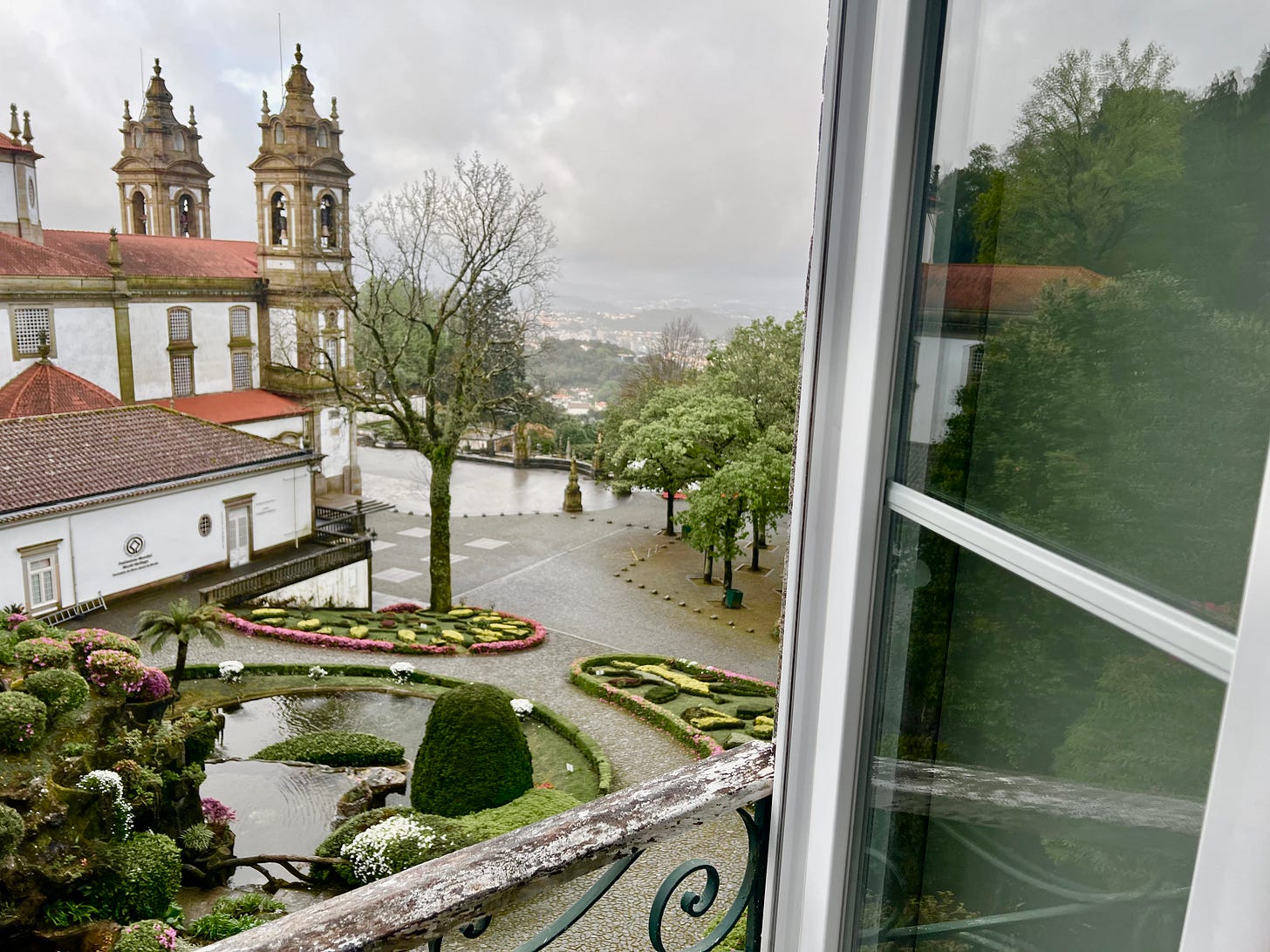
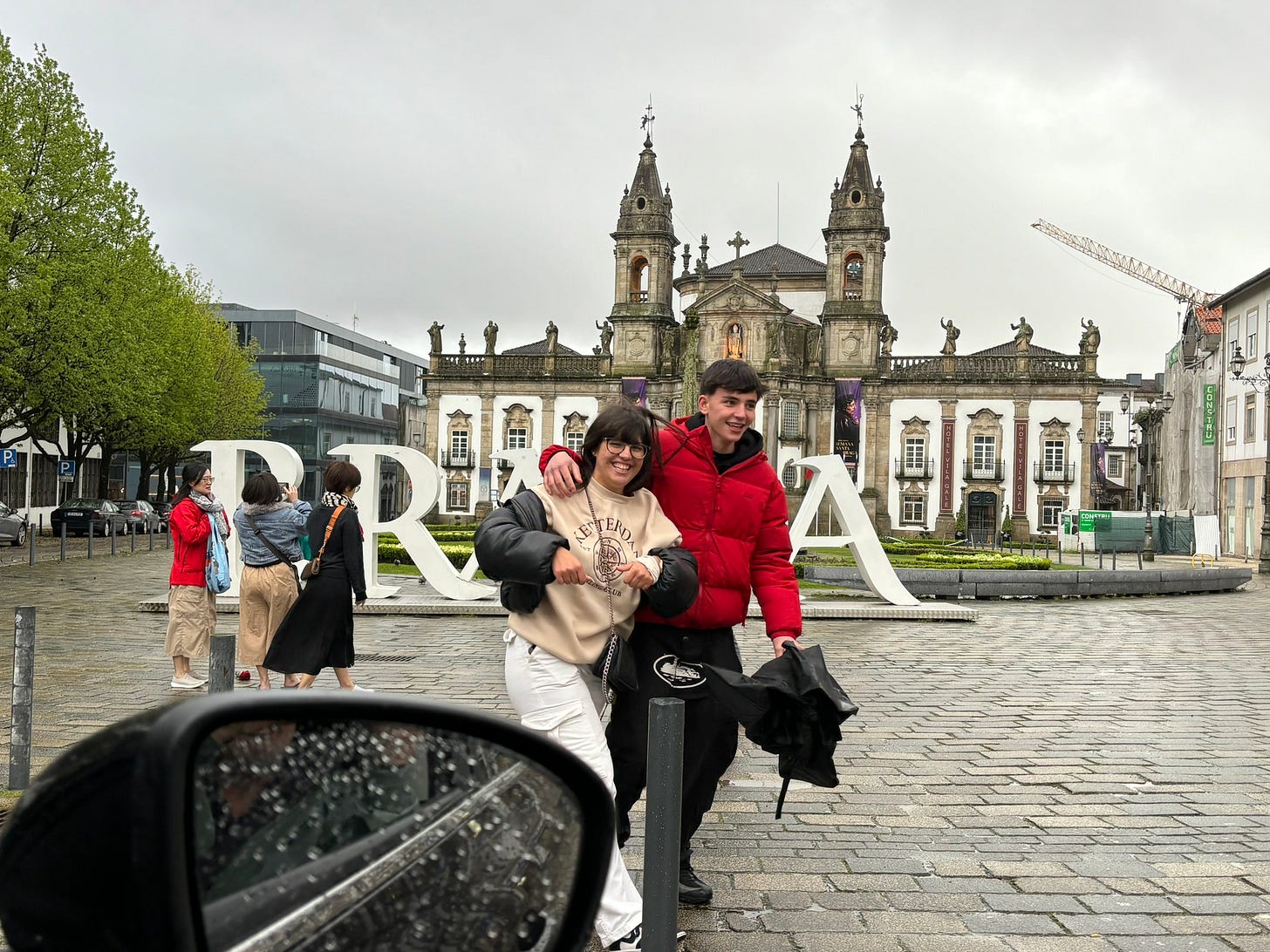
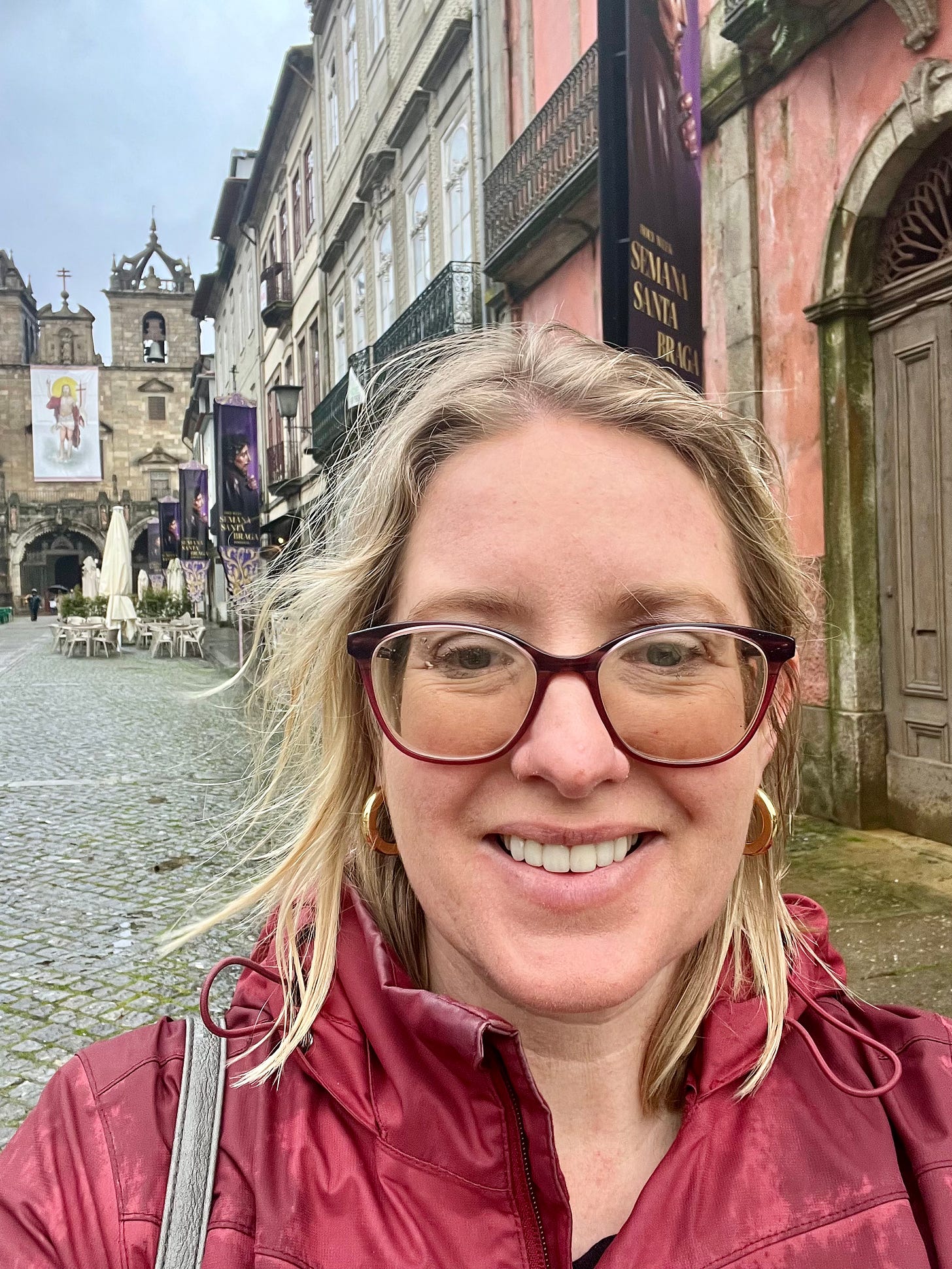
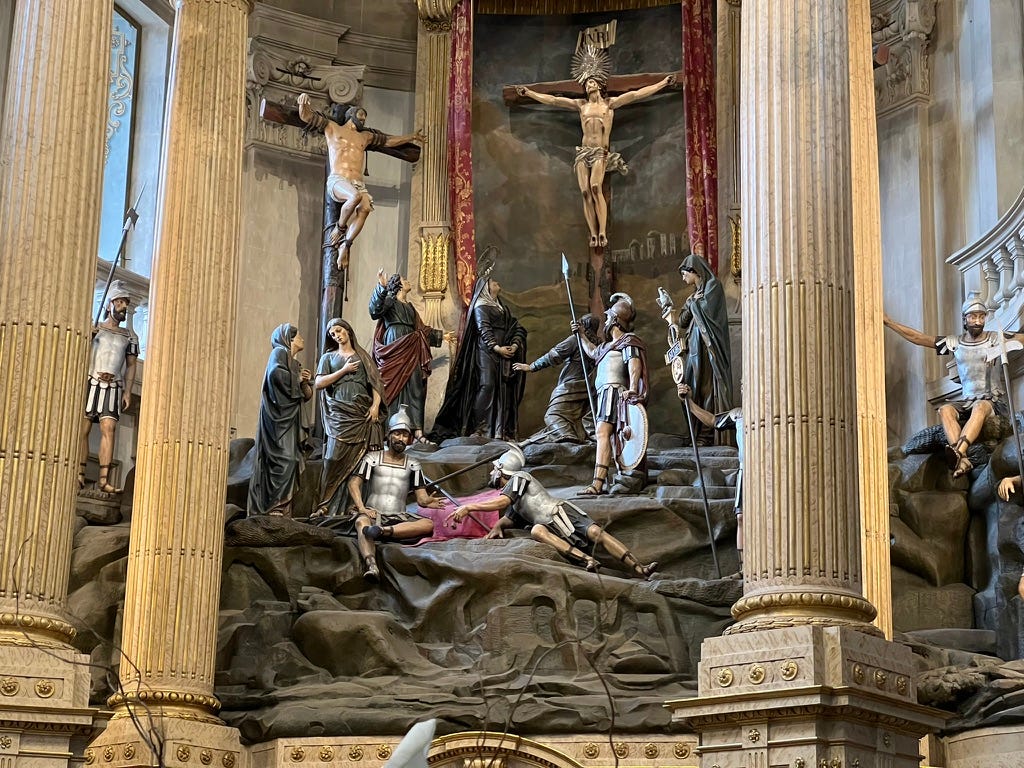
You did it! What an adventure! And (now, looking back) with a smile! And, you've learned well how it works: never be shy, just ask people. 99% will help actively, if they can or know.
By the way, the "tired traveller hotel sentence" goes: «Ela está morta.» (As in: «... morta de cansaço.» Cansaço = Tiredness). Oddly, we use the "circumstantial and temporary 'to be' verb" (v. estar) to «be dead» instead of the "permanent state 'to be' verb" (v. ser). In fact, if one's really dead, the verb is also... "estar"... I know, I know, it makes no sense... if you're dead, you're dead, it's a permanent state, no "movement". Maybe we do believe in resurrection, Hallelujah!, so... LOL But that's the beauty of it: exceptions and oddities welcome!
It's a wonderful place. You have to go to São Bento da Porta Aberta